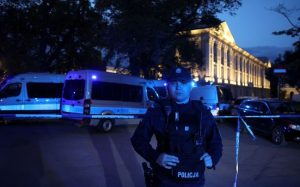California wildfires threaten to widen inequality
3 min readThe wildfires currently ravaging Southern California are often portrayed in the media as catastrophic events affecting wealthy neighborhoods and celebrity homes. However, in the midst of the destruction, the fires have also severely impacted communities of color, particularly in areas like Altadena, where a significant number of Black families and working-class residents have called home for generations.
Altadena, a diverse and economically mixed community, is home to roughly 42,000 residents, a majority of whom are people of color, including a large Black population. The area is known for its blend of modest bungalows and more expansive homes, and it has served as a haven for Black families seeking opportunities to thrive without facing the discriminatory housing practices that have historically excluded them from other parts of Los Angeles.
Samantha Santoro, a 22-year-old student at Cal Poly Pomona, expressed frustration with early media coverage of the fires that focused primarily on the destruction of celebrity estates. For families like hers, the loss is deeply personal. Santoro’s family lived in a two-bedroom home in Altadena that was rented affordably by their landlord, allowing them to save for their daughters’ education. Now, they are displaced and staying with relatives in Pasadena. While they have homeowners insurance, Santoro noted that the emotional toll of losing everything their parents worked for is overwhelming.
During the civil rights movement, Altadena became a rare opportunity for Black Americans to establish themselves in the middle class, as the area did not enforce discriminatory practices against them. This led to generational wealth, with many families able to pass down their homes and build successful careers. In fact, the Black homeownership rate in Altadena is notably higher than the national average, standing at 81.5%.
But as wildfires ravage the area, some fear that the local character of Altadena may be irreparably altered, particularly with rising property values and gentrification on the horizon. Victoria Knapp, president of the Altadena City Council, voiced concerns that those without resources would face displacement as developers target the area for redevelopment.
Kenneth Snowden, a local resident who bought a home in Altadena back in 1962, lost both his family home and his most recent property in the fires. Snowden is calling for equitable assistance from state and federal agencies for affected communities, urging that all homeowners, regardless of the value of their property, should receive adequate support. He proposed zero-interest mortgages to help people rebuild their homes and lives.
For Shawn Brown, the destruction of her home is compounded by the loss of the public charter school she founded, the Pasadena Rosebud Academy. Brown and other community members are working hard to raise funds to rebuild the school while looking for temporary locations at local churches. However, some of those churches, including Altadena Baptist Church, were also affected by the fires, leaving church leaders like Reverend George Van Alstine to help displaced families navigate insurance claims and federal aid.
Reverend Van Alstine is particularly concerned about the potential for gentrification, which could displace Black residents who can no longer afford to live in the area. Many families in his congregation are facing the harsh reality that rebuilding their homes may be financially out of reach.
Meanwhile, photographer Daniela Dawson, a longtime Altadena resident, fled the fires with just her cat and her car. Dawson lost nearly everything, including valuable camera gear, and lacks renters’ insurance to help recover her losses. While Dawson plans to temporarily relocate to Arizona, she is unlikely to return to Altadena, further exacerbating the community’s displacement.
The fires have not only destroyed homes but also disrupted the social and cultural fabric of Altadena. As the area begins its recovery, many residents fear that rising property values and an influx of wealthier residents will further widen the divide between the privileged and working-class communities, potentially driving out long-time Black and working-class families.
The impact of these wildfires extends far beyond the celebrity homes often showcased in the media. They are a stark reminder of the growing inequality and the threat of displacement faced by vulnerable communities, especially those already battling systemic challenges. For many in Altadena, the future is uncertain, and the road to recovery may be more difficult than they had ever imagined.








